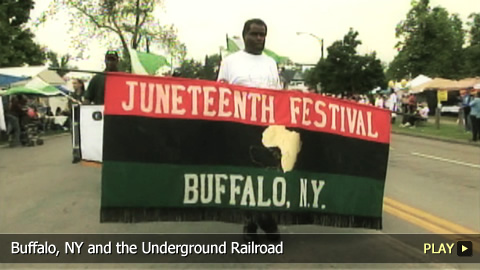Buffalo, NY and the Underground Railroad

advertisement
VOICE OVER: Rebecca Brayton
Found in western New York, Buffalo is an important city in the history of African Americans in the United States. Due to the city's proximity to the Canadian border, the city was an important stop on the Underground Railroad. As such, today there remain numerous landmarks and traditions honoring this time in history. Visit a historic jazz club, or partake in the Juneteenth festivities celebrating the end of slavery. And don't forget to take a guided tour of the city to ensure you don't miss any of the sites. In this video, http://www.WatchMojo.com will be learning more about the significance of New York's Buffalo-Niagara region to history of African Americans in the United States.
Important Stop on the Underground Railroad
The Buffalo-Niagara region is an important area in the history of the United States’ African American population. Due to its proximity to Canada, Buffalo-Niagara was an important stop for escaped slaves on the Underground Railroad. It is for this reason there are a number of significant landmarks and events associated with the Underground Railroad and the African American population.
Crossing into Canada
For example, slaves would trek across the Niagara River near Broderick Park and into finally Canada to help ensure their freedom.
Michigan Street Baptist Church and Reverend Nash
The Michigan Street Baptist Church was also once a stop on the Underground Railroad. Built in 1845, it is one of western New York’s oldest establishments that has always been owned and operated by African Americans. Used as a sanctuary for fugitive slaves, it was also used as a meeting place for anti-lynching protesters and abolitionists. Reverend Jesse Edward Nash Sr. presided over the congregation, and his home was the nearby Nash House. Also an important landmark, today it is a museum and research facility.
Juneteenth Festivities
Buffalo’s annual Juneteenth Festival is a celebration honouring the abolition of slavery. Also known as Freedom Day or Emancipation Day, it is celebrated each year on the 19th of June. A commemoration of Black Heritage, Juneteenth celebrations began in Texas and quickly spread throughout the country. Buffalo’s festival began in 1976, and is a weekend celebration for the area’s black community. Featuring booths that sell food and artefacts, as well as a parade, this gathering is a chance for the population to celebrate its independence.
Colored Musicians Club
Jazz music is another important element in the history of Buffalo, and the African American people. In 1935, the Colored Musicians Club was founded in Buffalo, and this spot became a popular stop for many of the era’s most notable jazz musicians. Still in existence today, the club has always been a place to foster a sense of community and to have a great time.
And, don’t forget to take a guided tour of Buffalo and its surroundings to get a clearer view of the area’s history and significance.

